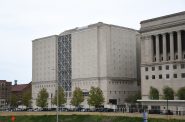County Looks to Add Electric Buses
County applies for federal grant for electric buses, though head of MCDOT not a fan.
![Electric bus. Photo by Ryanmirjanic [CC BY-SA 4.0 (https://creativecommons.org/licenses/by-sa/4.0)].](https://urbanmilwaukee.com/wp-content/uploads/2019/05/1024px-Electric_Bus.jpg)
Electric bus. Photo by Ryanmirjanic [CC BY-SA 4.0 (https://creativecommons.org/licenses/by-sa/4.0)].
If the county receives the grants, it must match the funds. The combined fund would then purchase four buses for a pilot program so the county’s Department of Transportation can study the implementation of the buses within the system.
There are a number of question marks for the county board and the department of transportation regarding battery electric buses, or BEB’s, and their viability within MCTS. Members of the board’s Finance and Audit Committee questioned the viability of the BEB’s during the summer and winter months at a May 16 meeting. And testimony from a Milwaukee County Transit System mechanic only fanned uncertainty from the committee.
Brown-Martin is not enthusiastic: “Not a big proponent of electric buses, but we’re doing what is asked of us,” she told the committee. Still, she said the county won’t have the information it needs to move towards an electric fleet without the pilot program. That program is largely thanks to Board Chairman Theodore Lipscomb, Sr. During the budget process for 2019, Lipscomb added an amendment that forced Milwaukee County along the path towards electric buses. At the time, Lipscomb explained the need for action on an electric fleet this way: “If we don’t get started we’re never gonna get there… I mean this is gonna take 15 years.”
Daniel Teatr, a chief garage steward with MCTS, provided testimony to the committee on potential problems the county may encounter with BEB’s, having spoken to officials and mechanics from transit agencies that have added BEB’s to their fleet. He said BEB’s have trouble when weather reaches the extremes of hot and cold that Wisconsin experiences in the summer and winter, throwing their reliability into question. He also mentioned that maintenance of the BEB’s might require keeping a bus out of operation to be used as a parts car, suggesting maintenance of BEB’s could be more involved than for a hybrid or diesel bus.
Though some concerns about BEB’s were expressed at committee, at the full board meeting on May 23, every supervisor except Sup. Dan Sebring voted to apply for the grant. And, in a statement reminding colleagues of the board’s stated policy via the budget amendment, Lipscomb said, “We should probably get some grant funds since we are buying electric buses.”
Transit agencies throughout the country are introducing electric buses to their fleets. Some quite ambitiously. In Minneapolis and St. Paul, the local transit agency, Metro Transit, is planning to gradually phase 125 buses into their transit system by 2022.
In King County, Washington, home to Seattle, the Federal Transit Administration and the National Renewable Energy Laboratory conducted a 12 month study of a pilot program for BEB’s. This study does not definitively conclude whether BEB’s are the way to go. Rather the study found areas where BEB’s produced more favorable data than diesel, hybrid or trolley cars, and others where it did not.
One area in the study where BEB’s fell short is in fuel cost. When the electricity is measured using the diesel-gallon-equivalent, the fuel cost was nearly five times as much. Fluctuations in the price of diesel fuel already has the power to kick a hole in the MCTS budget.
BEB’s outperformed diesel and trolly systems but not hybrids in average mileage per bus. But BEB’s did outperform every bus type in fuel economy. BEB’s also had the lowest maintenance per mile cost, by a significant margin, than both diesel and hybrid.
The weather and temperature were factors in the King County study, but did not correlate with significant operation issues for BEBs. The winter bring with it lower fuel economy and higher electricity rates. In fact, ambient air temperature correlates closely with fuel economy. As the temperature rises, the fuel economy also tends to rise. And Milwaukee has lower average temperatures in the winter and only slightly warmer summers than Seattle.
Beyond the performance of the buses, there are some structural challenges for transit agencies, like MCTS, outlined in the King County study. For example, operators require specific training for the unique docking procedures. Keeping the chargers for buses running is important, as down-time on a charger can cause serious delays. Finally, the operation and scheduling of the buses is intrinsically linked to infrastructure, like charging stations, throughout the system.
But by the end of the study period King County Metro was already increasing the operation of its BEB’s. And since then, the transit agency was satisfied enough with their performance to purchase 20 new BEB’s.
If you think stories like this are important, become a member of Urban Milwaukee and help support real independent journalism. Plus you get some cool added benefits, all detailed here.
MKE County
-
Key Questions in Dugan Trial Take Shape on First Day
 Dec 15th, 2025 by Graham Kilmer
Dec 15th, 2025 by Graham Kilmer
-
FTA Tells Milwaukee to Crack Down on Fare Evasion — Even Where Fares Don’t Exist
 Dec 12th, 2025 by Graham Kilmer
Dec 12th, 2025 by Graham Kilmer
-
Legal Filing Describes ‘Horrid Living Conditions’ at County Jail
 Dec 11th, 2025 by Graham Kilmer
Dec 11th, 2025 by Graham Kilmer
Transportation
-
Congestion Pricing Cuts Air Pollution in New York City
 Dec 14th, 2025 by Jeff Wood
Dec 14th, 2025 by Jeff Wood
-
FTA Tells Milwaukee to Crack Down on Fare Evasion — Even Where Fares Don’t Exist
 Dec 12th, 2025 by Graham Kilmer
Dec 12th, 2025 by Graham Kilmer
-
Will GOGO’s Bus Service Ever Get Going?
 Dec 9th, 2025 by Jeramey Jannene
Dec 9th, 2025 by Jeramey Jannene





















